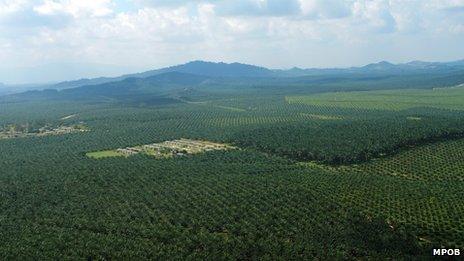Genome of oil palm sequenced
- Published

In Asia huge swathes of rainforest have been felled to make way for oil palms
The genome of one of the world's key commercial crops, the oil palm, has been sequenced.
The plant's oil is used in many food and household products, but has caused controversy because large areas of rainforest have been cleared to make way for plantations.
Through deciphering the crop's DNA, researchers have identified the genes that could help to produce a more sustainable crop.
The work is published in Nature, external.
Fleshy fruit
The oil from palms has a wide variety of uses and is found in food, soaps and shampoos and biofuels.
But as demand for the product has grown, rainforests, particularly those in South East Asia, have suffered. Trees have been felled to make way for the crop.
Now though, scientists say an insight into the plant's genes could help.
An international team sequenced the genome of the oil palm, deciphering 1.8 billion "letters" of DNA.
Prof Robert Martienssen, from the Cold Spring Harbour Laboratory in the US, said: "These large plant genomes are very challenging to sequence, in part because of the size, but also because they have a lot of repetitive sequences, which makes it difficult to put the jigsaw puzzle together.
"We had to use some very advanced technology to do this."
Within this code, the researchers found a gene that made some of the trees produce more oil than others.
Dr Rajinder Singh, from government agency the Malaysian Palm Oil Board, said: "The oil palm has three fruit forms. We have the thick-shelled type - the Dura; those that don't have any shell - the Pisifera - but are not used for commercial production; and we have a third form produced as a cross between the thick shell and the one without the shell, which is known as the Tenera.
"It has a thinner shell, but more of the fleshy fruit to produce the oil, and it is the one used for commercial production. And we identified the gene producing this trait."
Sustainable crop?
While oil palm growers attempt to grow only the thin-shelled Tenera variety, up to 10% of the seeds can be contaminated, and turn out to be the other less oily plants.

Thin-shelled fruits (left) produce about 30% more oil than the thick-shelled variety (right)
Now the researchers say they can use the genetic information to identify the seeds that carry this trait.
Prof Martienssen said: "We can now use that gene in genetic testing, which will allow breeders as well as producers to know exactly what sort of tree they are planting before it produces fruit.
"It takes a long time for these trees to produce fruit, and by being able to predict exactly what sort of fruit that tree will produce, it will greatly assist breeders."
The researchers say this could offer a more sustainable form of agriculture.
Dr Ravigadevi Sambanthamurthi, from the Malaysian Palm Oil Board, said: "This finding gives us huge hope. We hope to maximise land usage and produce a lot more on the same amount of land... because we do not want to get into the rainforest any more, we have cleared enough."
However the environmental group WWF-UK said that the oil palm was already a very productive crop and that the global demand was growing rapidly, making the expansion of plantations inevitable.
Adam Harrison, the organisation's food and agriculture policy officer, said: "In a sense it does not matter if a 'good' variety replaces forest or a 'bad' one - the wildlife and communities that need access to that land will suffer.
"So for palm oil to be sustainable, the process of allocating and converting land needs to be controlled.
"There is an abundance of low-carbon, low-wildlife and conflict-free land available in Indonesia and Malaysia, where most palm oil is grown, and there is no more need for forest areas to be converted."
- Published22 July 2013
- Published26 November 2013
- Published24 June 2013
- Published28 June 2012
- Published27 December 2011